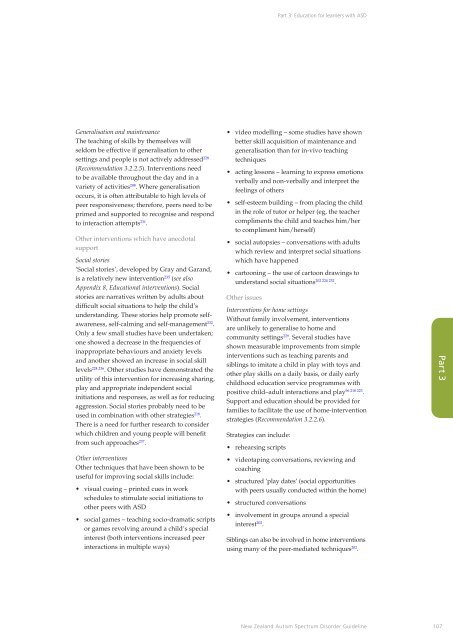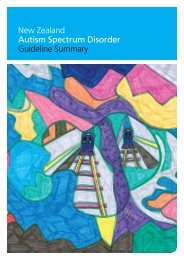New Zealand Autism Spectrum Disorder Guideline - Ministry of Health
New Zealand Autism Spectrum Disorder Guideline - Ministry of Health
New Zealand Autism Spectrum Disorder Guideline - Ministry of Health
Create successful ePaper yourself
Turn your PDF publications into a flip-book with our unique Google optimized e-Paper software.
Part 3: Education for learners with ASD<br />
Generalisation and maintenance<br />
The teaching <strong>of</strong> skills by themselves will<br />
seldom be effective if generalisation to other<br />
settings and people is not actively addressed 228<br />
(Recommendation 3.2.2.5). Interventions need<br />
to be available throughout the day and in a<br />
variety <strong>of</strong> activities 208 . Where generalisation<br />
occurs, it is <strong>of</strong>ten attributable to high levels <strong>of</strong><br />
peer responsiveness; therefore, peers need to be<br />
primed and supported to recognise and respond<br />
to interaction attempts 231 .<br />
Other interventions which have anecdotal<br />
support<br />
Social stories<br />
‘Social stories’, developed by Gray and Garand,<br />
is a relatively new intervention 235 (see also<br />
Appendix 8, Educational interventions). Social<br />
stories are narratives written by adults about<br />
difficult social situations to help the child’s<br />
understanding. These stories help promote selfawareness,<br />
self-calming and self-management 232 .<br />
Only a few small studies have been undertaken;<br />
one showed a decrease in the frequencies <strong>of</strong><br />
inappropriate behaviours and anxiety levels<br />
and another showed an increase in social skill<br />
levels 224 236 . Other studies have demonstrated the<br />
utility <strong>of</strong> this intervention for increasing sharing,<br />
play and appropriate independent social<br />
initiations and responses, as well as for reducing<br />
aggression. Social stories probably need to be<br />
used in combination with other strategies 218 .<br />
There is a need for further research to consider<br />
which children and young people will benefit<br />
from such approaches 237 .<br />
Other interventions<br />
Other techniques that have been shown to be<br />
useful for improving social skills include:<br />
• visual cueing – printed cues in work<br />
schedules to stimulate social initiations to<br />
other peers with ASD<br />
• social games – teaching socio-dramatic scripts<br />
or games revolving around a child’s special<br />
interest (both interventions increased peer<br />
interactions in multiple ways)<br />
• video modelling – some studies have shown<br />
better skill acquisition <strong>of</strong> maintenance and<br />
generalisation than for in-vivo teaching<br />
techniques<br />
• acting lessons – learning to express emotions<br />
verbally and non-verbally and interpret the<br />
feelings <strong>of</strong> others<br />
• self-esteem building – from placing the child<br />
in the role <strong>of</strong> tutor or helper (eg, the teacher<br />
compliments the child and teaches him/her<br />
to compliment him/herself)<br />
• social autopsies – conversations with adults<br />
which review and interpret social situations<br />
which have happened<br />
• cartooning – the use <strong>of</strong> cartoon drawings to<br />
understand social situations 202 224 232 .<br />
Other issues<br />
Interventions for home settings<br />
Without family involvement, interventions<br />
are unlikely to generalise to home and<br />
community settings 229 . Several studies have<br />
shown measurable improvements from simple<br />
interventions such as teaching parents and<br />
siblings to imitate a child in play with toys and<br />
other play skills on a daily basis, or daily early<br />
childhood education service programmes with<br />
positive child–adult interactions and play 96 218 223 .<br />
Support and education should be provided for<br />
families to facilitate the use <strong>of</strong> home-intervention<br />
strategies (Recommendation 3.2.2.6).<br />
Strategies can include:<br />
• rehearsing scripts<br />
• videotaping conversations, reviewing and<br />
coaching<br />
• structured ‘play dates’ (social opportunities<br />
with peers usually conducted within the home)<br />
• structured conversations<br />
• involvement in groups around a special<br />
interest 202 .<br />
Siblings can also be involved in home interventions<br />
using many <strong>of</strong> the peer-mediated techniques 202 .<br />
Part 3<br />
<strong>New</strong> <strong>Zealand</strong> <strong>Autism</strong> <strong>Spectrum</strong> <strong>Disorder</strong> <strong>Guideline</strong> 107











